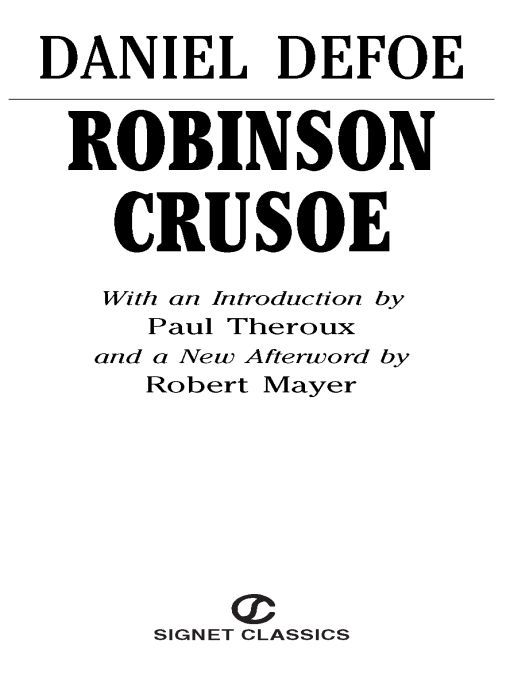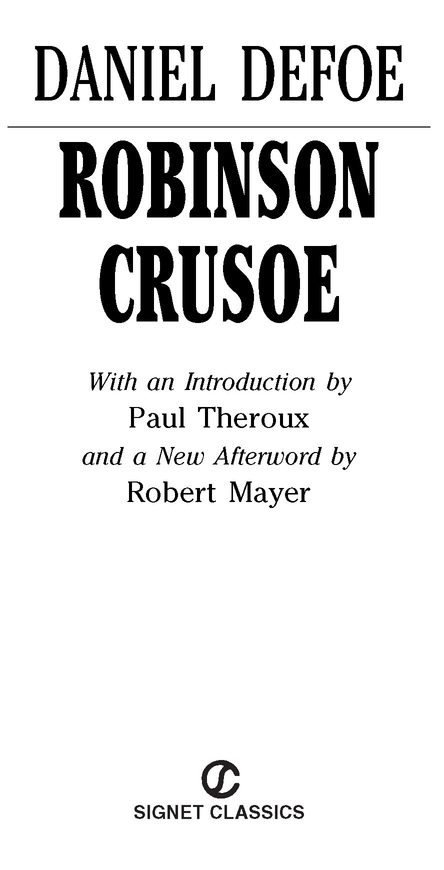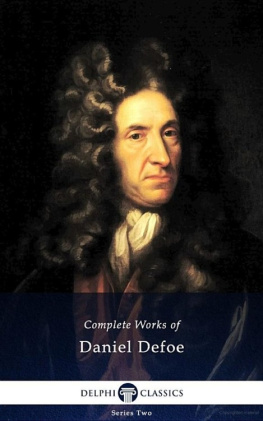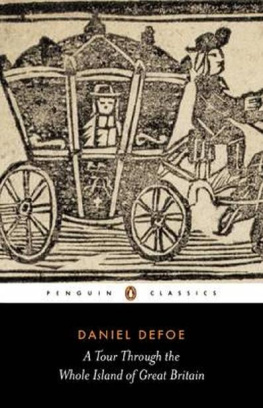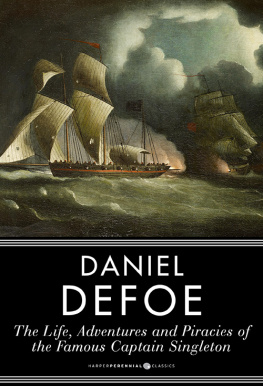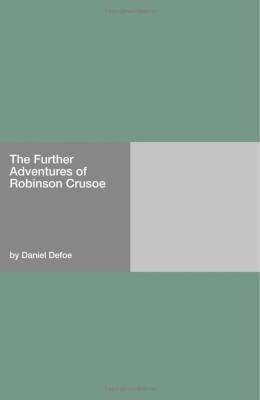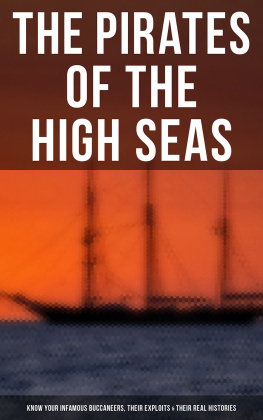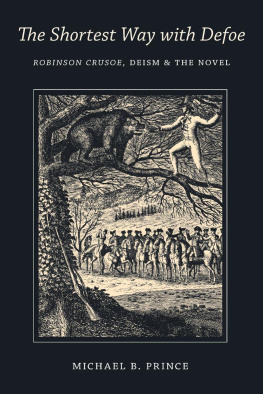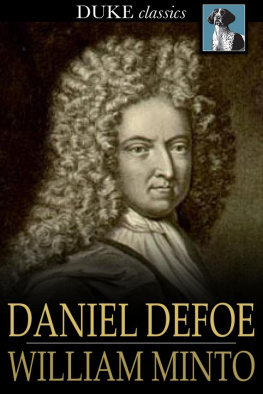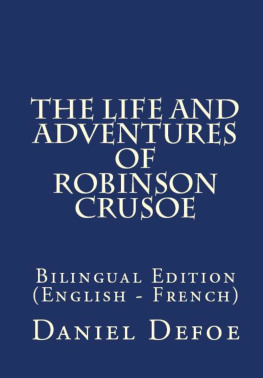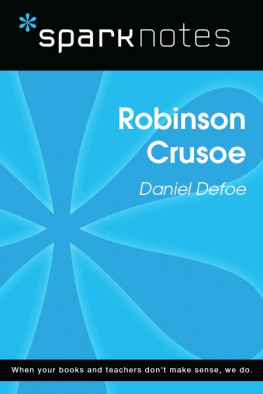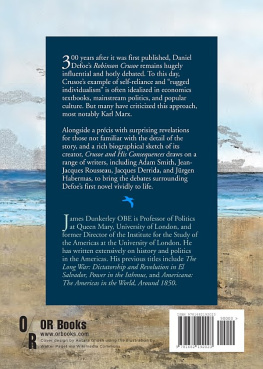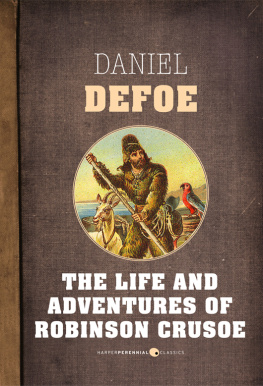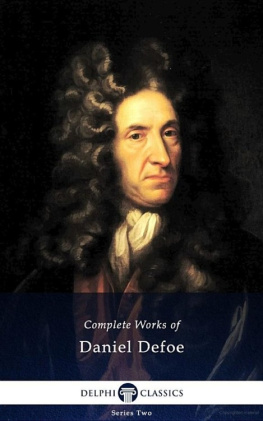Table of Contents
Daniel Defoe (1660-1731) lived a life full of business successes and reverses, financial gains and losses, and political victories and defeats. Sent by his father to study for the ministry, Defoe entered the business world instead. In 1685, Defoe took part in the Duke of Monmouths ill-fated rebellion against King James II; and in 1688, he joined a volunteer regiment that acted as William IIIs escort into London. By 1692, Defoes business affairs had foundered and creditors filed suit against him, but he talked his way out of debtors prison. His poem The True-Born Englishman (1701) met with resounding success. In 1702, after he attacked the Tories in a pamphlet, the enraged government imprisoned him for two years; upon his release, he became a secret agent for the government. Between 1718 and 1723 he published Robinson Crusoe, Moll Flanders, and A Journal of the Plague Year.
Paul Theroux is the award-winning author of such novels as Picture Palace (winner of the Whitbread Prize for fiction) , The Mosquito Coast, My Secret History, Saint Jack, and Kowloon Tong. He has also published numerous best-selling travel books, including The Great Railway Bazaar, The Kingdom by the Sea, and The Pillars of Hercules.
Robert Mayer is Professor of British Literature and Director of the Screen Studies Program at Oklahoma State University. He is the author of History and the Early English Novel: Matters of Fact from Bacon to Defoe and the editor of Eighteenth-Century Fiction on Screen. His recent work includes the essay Robinson Crusoe in Hollywood and an ongoing study of authorship and reading that focuses on Sir Walter Scott.
Introduction
Robinson Crusoe, an adventure story of the ultimate castaway, is so established in most peoples minds that even those who have not read it know some details of the story: Shipwreck. Desert island. Goatskin jacket and funny hat. Hairy umbrella. Talking parrot. Shocking footprint. Man Friday. Cannibals. Rescue. It is all so familiar as an apparently simple, wonderful tale of survival that it is easily read as a great yarn.
Crusoe is too human and accident prone to be truly heroicthis may be another reason for his enduring appeal. But the island setting is also a compelling feature of his story, for the island as a microcosm of the world has been used imaginatively in English in works as diverse as Shakespeares The Tempest and Goldings Lord of the Flies. Crusoe is more stubborn than brave, and his first-person narrative, the more believable for being defiantly unliterary, can be appreciated as the account of a mans twenty-eight-year ordeal of loneliness, hunger, and physical threat; a man who ingeniously succeeds against the odds. But it is all so assured and so filled with plausible episodes and peculiar wisdom, it helps to be reminded that it was the first English novel and was written by a man nearly sixty, who resembled his fictional creation in his need to scheme in order to survive. Defoe was a master of improvisation, and he had to be, for his life was a chronicle of ups and downswhich is a fair description of this novel.
Daniel Defoe (1660-1731) was, in the words of one critic, a shrewd, shifty, ingenious man, much mistrusted and frequently imprisoned. He was imprisoned for debt as well as for his satirical writing, and his reverses included bankruptcy and the failure of get-rich-quick schemes, of which raising civet cats (their glands were used for perfume) for quick cash was just one. He was a journalist, publisher, poet, businessman, and sometime secret agent, whose first novelthe first in the English languagewas a huge hit, running into many editions and being quickly pirated and imitated.
One of the reasons for the success of this piece of fiction was that it was taken for fact. It is utterly, vulgarly modern in that sense. In the preface, Defoe, wearing the mask of editor, wrote, The editor believes the thing to be a just history of fact; neither is there any appearance of fiction in it. Defoe (who took the view that fiction could be a low and subversive trick that encouraged mendacity) had hit upon an idea that persists to this daythat if a book is said to be true, it is somehow a more important and authentic piece. A true story, based on actual events, runs the assertion in the made-for -TV movie. It really happened! the person says, who urges you to read such a book. That was also what Defoe wanted people to say in 1719 when Robinson Crusoe was first published; and they did say it and believed it.
The story is sensationaleven today a story about such a castaway would be front-page news. But with time and rereading this adventure deepens in meaning, and the longer you live, the more impressive an achievement Robinson Crusoe becomes, turning from amazing tale to a subtle study in innovation, a metaphor for human survival, and ultimately one of our own mythical tales, almost Biblical in its morality: Robinson is as vivid and unambiguous a character as Job or Jonah, two people he specifically mentions.
And surely it is significant that the very first English novel is a desert island story, just one man in the middle of nowhere, with almost nothing, who survives to create a whole world. In this sense the novel is like an allegory of the history of humankind. The narrative emerges from chaos, with no society or props to speak of. A whole metaphor of creation is described in this book, which is as surprising in its action as in its intelligence. Its contradictions are the contradictions in the lives of many people; it embodies many of our discontents and dilemmas. No women figure in its drama; there is no passion, and though there is affection, there is hardly any love. But in its understated way the novel discusses just about everything elsematerialism, isolation, arrogance, travel, friendship, imperialism, rebellious children, the relativity of wealth, the conundrum of power, the ironies of solitude, learning by doing; it is about faith, atonement, and the passage of time. It is also as practical as a pair of shoes. No sooner is the ordeal over than Crusoe is back, founding a colony and counting his money; and in the same way, the Crusoe idea continued, producing sequels and parodies, giving words to the languageCrusoe is a byword for castaway, as Friday is a synonym for helper.
Robinson begins life as a disobedient and hubristic, if accident-prone boy. He is given any amount of advice by his sententious father, the German immigrant to England, Herr Kreutznaer, who anglicized his name to Crusoe. The name change is a nice touch in a book full of detail, which is the more plausible for its being strange and even somewhat unnecessary. But as it happens, Defoe also changed his name, Frenchifying it, for his fathers name was plain Mr. Foe. Daniel Defoe was anything but average, but he chose to write about a pretty ordinary, though arrogant, young man who (ignoring his fathers Teutonic and pedestrian sermon on the safety of staying home) leaves home and finds himself involved in extraordinary events, beginning just days after his departure, when on his first voyage, his ship sinks. He is not deterred, and not even put off by a fairly prescient man who looks him in the eye and says that wherever he goes he will meet with nothing but disasters and disappointments.

